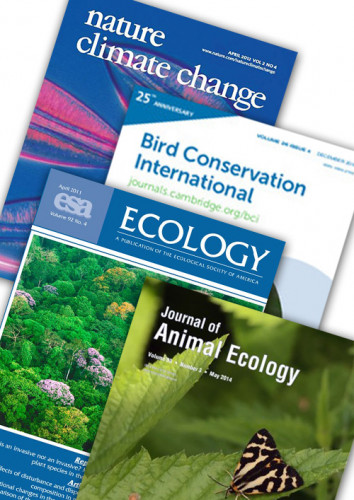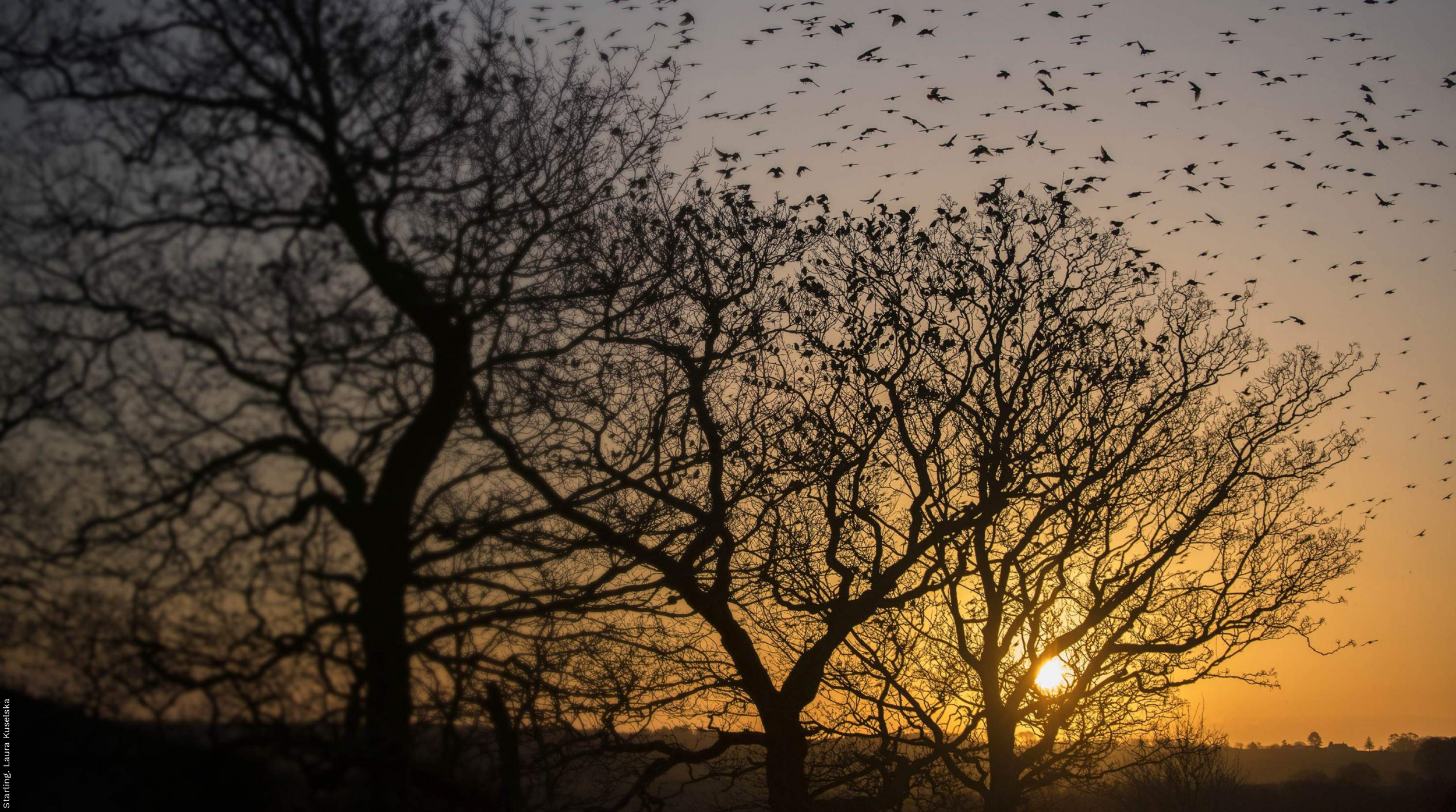Peer-reviewed papers

It is BTO’s policy to make public the results of our research. Our aim is to publish as much as possible of our work in the peer reviewed scientific literature. Many results are also published in our BTO Research Report series.
2011.
Post release dive ability in rehabilitated harbour seals.
Marine Mammal Science
28 (part 2)
: 110-123
View Abstract
Link to Article (DOI: 10.1111/j.17487692.2011.00510.x)
2011.
Overwinter population estimates of British waterbirds.
British Birds
104
: 364-397
View Abstract
2011.
Evaluating the population-level impact of an invasive species, Ring-necked Parakeet Psittacula krameri, on native avifauna.
Ibis
153
: 509-516
Link to Article (DOI: 10.1111/j.1474-919X.2011.01121.x)
2011.
On the edge:can the Spoon-billed Sandpiper be saved?.
British Birds
104
: 350-363
View Abstract
2011.
Modelling conservation management options for a southern range-margin population of Golden Plover Pluvialis apricaria vulnerable to climate change.
Ibis
153 (part 2)
: 345-356
View Abstract
Link to Article (DOI: 10.1111/j.1474-919X.2011.01108.x)
2011.
Targeting research to underpin climate change adaptation for birds.
Ibis
153
: 207-211
Link to Article (DOI: 10.1111/j.1474-919X.2010.01086.x)
2011.
The relationship between multi-scale habitat heterogeneity and farmland bird abundance.
Ecography
34 (part 6)
: 955-969
View Abstract
Link to Article (DOI: 10.1111/j.1600-0587.2011.06608.x)
2011.
Frameworks for risk communication and disease management: the case of Lyme disease and countryside users.
Philosophical Transactions of the Royal Society B
366
: 2 010-2 022
View Abstract
Link to Article (DOI: 10.1098/rstb.2010.0397)
2011.
Among-colony synchrony in the survival of Common Guillemots Uria aalge reflects shared wintering areas.
Ibis
153 (part 4)
: 818-831
View Abstract
Link to Article (DOI: 10.1111/j.1474-919X.2011.01149.x)
2011.
Using stable-isotope analysis as a technique for determining consumption of supplementary foods by individual birds..
Condor
113 (part 3)
: 475-482
View Abstract
Link to Article (DOI: 10.1525/cond.2011.090111)
2011.
Assessing breeding success in common woodland birds using a novel method.
Bird Study
58
: 409-420
View Abstract
Link to Article (DOI: 10.1080/00063657.2011.606497)
2011.
Goodness-of-fit Measures of Evenness: A New Tool for Exploring Changes in Community Structure.
Ecosphere
2 (part 2)
: 1-19
Link to Article (DOI: 10.1890/ES10-00074.1)
2011.
Rarity, life history and scaling of the dynamics in time and space of British birds
.
Journal of Animal Ecology
80
: 215-224
View Abstract
Link to Article (DOI: 10.1111/j.1365-2656.2010.01751.x)
2011.
Developing our Understanding of Biodiversity in Scotland's Gardens: the Role of the BTO's Garden Birdwatch.
Book title: The Changing Nature of Scotland
TSO Scotland, Edinburgh
: 479-484
2011.
Eurasian Bittern distribution and abundance in the UK during the 2009/10 winter.
British Birds
104
: 636-641
2010.
Trophic level asynchrony in rates of phenological change for marine, freshwater and terrestrial environments..
Global Change Biology
16 (part 12)
: 3 304-3 313
View Abstract
Link to Article (DOI: 10.1111/j.1365-2486.2010.02165.x)
2010.
Recent patterns of change in vegetation structure and tree composition of British broadleaved woodland: evidence from large-scale surveys.
Forestry
83
: 345-356
Link to Article (DOI: 10.1093/forestry/cpq017)
2010.
Impacts of shellfisheries and nutrient inputs on waterbird communities in the Wash, England.
Journal of Applied Ecology
47
: 191-199
Link to Article (DOI: 10.1111/j.1365-2664.2009.01760.x)
2010.
Healthy & Biologically Diverse Seas Evidence Group Technical Report Series: Evaluation and gap analysis of current and potential indicators for Seabirds & Waterbirds.
JNCC, Peterborough.
2010.
Habitat associations and breeding bird community composition within the city of Bristol, UK.
Bird Study
57
: 183-196
Link to Article (DOI: 10.1080/00063650903490270)
2010.
The breeding status of Peregrine Falcons Falco peregrinus in the UK and Isle of Man in 2002.
Bird Study
57
: 421-436
Link to Article (DOI: 10.1080/00063657.2010.511148)
2010.
The role of the Eurasian Sparrowhawk (Accipiter nisus) in the decline of the House Sparrow (Passer domesticus) in Britain.
Auk
127
: 411-420
Link to Article (DOI: 10.1525/auk.2009.09108)
2010.
The impacts of non-native species: a review of the British Ornithologists' Union's Autumn 2008 Scientific Meeting.
Ibis
152
: 654-659
Link to Article (DOI: 10.1111/j.1474-919X.2010.01033.x)
2010.
Birds of the Severn Estuary and Bristol Channel: their current status and key environmental issues.
Marine Pollution Bulletin
61
: 115-123
Link to Article (DOI: 10.1016/j.marpolbul.2009.12.018)
2010.
Evaluating the potential impacts of tidal power schemes on estuarine waterbirds.
BOU Proceedings 2010 - Climate Change and Birds
View Abstract
2010.
Resource availability and the persistence of seed-eating bird populations in agricultural landscapes : a mechanistic modelling approach.
Journal of Applied Ecology
47
: 67-75
Link to Article (DOI: 10.1111/j.1365-2664.2009.01750.x)
2010.
The ranging behaviour and habitat selection by three Hawfinches Coccothraustes coccothraustes in late winter in Scotland.
Ornis Fennica
87
: 119-123
View Abstract
2010.
Variation in the diurnal activity of breeding Short-eared Owls Asio flammeus: implications for their survey and monitoring.
Bird Study
57
: 89-99
Link to Article (DOI: 10.1080/00063650903437503)
2010.
An Integrated Population Model from Constant Effort bird-ringing data.
Journal of Agricultural, Biological and Environmental Statistics
15
: 199-137
2010.
Does organic farming benefit farmland birds in winter?.
Biology Letters
6
: 82-84
Link to Article (DOI: 10.1098/rsbl.2009.0643)
2010.
Bird ringing in Britain and Ireland in 2009.
Ringing & Migration
25
: 88-127
View Abstract
Link to Article (DOI: 10.1080/03078698.2010.9674421)
2010.
The use of light-level geolocators to study wader movements.
Wader Study Group Bulletin
117
View Abstract
2010.
Conservation in action in Britain & Ireland.
Book title: Silent Summer: the state of wildlife in Britain and Ireland.
Cambridge University Press, Cambridge
2010.
The impacts of non-native species - an introduction. In: BOU Proceedings 2010 - The Impacts of non-native Species.
View Abstract
2010.
Assessing the impact of Environmental Stewardship on lowland farmland birds in England.
Aspects of Applied Biology
100
: 51-58
Link to Article (DOI: 10.1111/j.1474-919X.2009.01001.x)
2010.
Entry Level Stewardship may enhance bird numbers in boundary habitats.
Bird Study
57
: 415-420
Link to Article (DOI: 10.1080/00063657.2010.505642)
2010.
Assessing the impact of Entry Level Stewardship on lowland farmland birds in England.
Ibis
152
: 459-474
Link to Article (DOI: 10.1111/j.1474-919x.2009.01001.x)
2010.
Contrasting patch selection of breeding Yellowhammers Emberiza citrinella in set-aside and cereal crops.
Bird Study
57
: 69-74
Link to Article (DOI: 10.1080/00063650903311518)
2010.
How important are climate-induced changes in host availability for population processes in an obligate brood parasite, the European cuckoo?.
Oikos
Link to Article (DOI: 10.1111/j.1600-0706.2010.18388.x)
2010.
Variation in arthropod abundance in barley under varying sowing regimes.
Agriculture, Ecosystems and Environment
135
: 127-131
2010.
Managing water levels on wet grasslands to improve foraging conditions for breeding northern lapwing Vanellus vanellus.
Journal of Applied Ecology
47
: 452-458
Link to Article (DOI: 10.1111/j.1365-2664.2010.01783.x)
2010.
The effect of observer experience on English Breeding Bird Survey population trends.
Bird Study
57
: 129-141
Link to Article (DOI: 10.1080/00063650903440648)
2010.
Representation of ecosystem services by tiered conservation strategies.
Conservation Letters
3
: 184-191
Link to Article (DOI: 10.1111/j.1755-263X.2010.00102.x)
2010.
Error propagation associated with benefits transfer based mapping of ecosystems.
Biological Conservation
143
: 2 487-2 493
Link to Article (DOI: 10.1016/j.biocon.2010.06.015)
2010.
The impact of proxy-based methods on mapping the distribution of ecosystem services.
Journal of Applied Ecology
: 377-385
Link to Article (DOI: 10.1111/j.1365-2664.2010.01777.x)
2010.
The development of bird indicators for British freshwaters and wetlands.
Aquatic Conservation - Marine and Freshwater Ecosystems
20
: 117-124
Link to Article (DOI: 10.1002/aqc.1074)



Share this page